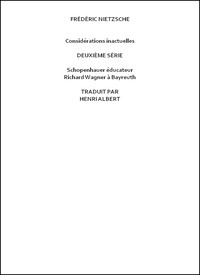Considérations inactuelles, deuxième série by Friedrich Wilhelm Nietzsche
"Considérations inactuelles, deuxième série" by Friedrich Wilhelm Nietzsche is a philosophical work written in the late 19th century. This text delves into the ideas of education, culture, and the examination of contemporary societal norms, particularly through the lens of influential figures like Arthur Schopenhauer and Richard Wagner. Nietzsche's work is centered around critiquing the mediocrity and 'public opinion' that he perceives in modern society, advocating for personal authenticity and philosophical inquiry. The
opening of the book introduces a traveler reflecting on the inherent laziness of humanity and their fear of embracing individuality. His observations lead to a critique of societal norms that compel individuals to conform, stifling their true selves in favor of public approval and conventionality. Nietzsche highlights the importance of artists and thinkers in revealing the unique essence of humanity, arguing that true happiness and authenticity can only be achieved by breaking free from societal chains. The initial passages set the stage for a discussion on the role of the philosopher as an educator and liberator, particularly referencing the philosophical contributions of Schopenhauer, who serves as Nietzsche's guiding example. (This is an automatically generated summary.)
Read now or download (free!)
| Choose how to read this book | Url | Size | ||||
|---|---|---|---|---|---|---|
| Read online (web) | https://www.gutenberg.org/ebooks/48006.html.images | 533 kB | ||||
| EPUB3 (E-readers incl. Send-to-Kindle) | https://www.gutenberg.org/ebooks/48006.epub3.images | 252 kB | ||||
| EPUB (older E-readers) | https://www.gutenberg.org/ebooks/48006.epub.images | 257 kB | ||||
| EPUB (no images, older E-readers) | https://www.gutenberg.org/ebooks/48006.epub.noimages | 252 kB | ||||
| Kindle | https://www.gutenberg.org/ebooks/48006.kf8.images | 401 kB | ||||
| older Kindles | https://www.gutenberg.org/ebooks/48006.kindle.images | 363 kB | ||||
| Plain Text UTF-8 | https://www.gutenberg.org/ebooks/48006.txt.utf-8 | 499 kB | ||||
| Download HTML (zip) | https://www.gutenberg.org/cache/epub/48006/pg48006-h.zip | 219 kB | ||||
| There may be more files related to this item. | ||||||
Similar Books
About this eBook
| Author | Nietzsche, Friedrich Wilhelm, 1844-1900 |
|---|---|
| Translator | Albert, Henri, 1869-1921 |
| Title |
Considérations inactuelles, deuxième série Schopenhauer éducateur, Richard Wagner à Bayreuth |
| Note | Reading ease score: 58.4 (10th to 12th grade). Somewhat difficult to read. |
| Note | Wikipedia page about this book: https://en.wikipedia.org/wiki/Untimely_Meditations Wikipedia page about this book: https://fr.wikipedia.org/wiki/Consid%C3%A9rations_inactuelles |
| Credits |
Produced by Adrian Mastronardi, Eleni Christofaki and the Online Distributed Proofreading Team at http://www.pgdp.net (This file was produced from images generously made available by the Bibliothèque nationale de France (BnF/Gallica) at http://gallica.bnf.fr) |
| Language | French |
| LoC Class | B: Philosophy, Psychology, Religion |
| Subject | Schopenhauer, Arthur, 1788-1860 -- Criticism and interpretation |
| Subject | Wagner, Richard, 1813-1883 -- Criticism and interpretation |
| Category | Text |
| EBook-No. | 48006 |
| Release Date | Jan 17, 2015 |
| Copyright Status | Public domain in the USA. |
| Downloads | 160 downloads in the last 30 days. |
| Project Gutenberg eBooks are always free! | |

